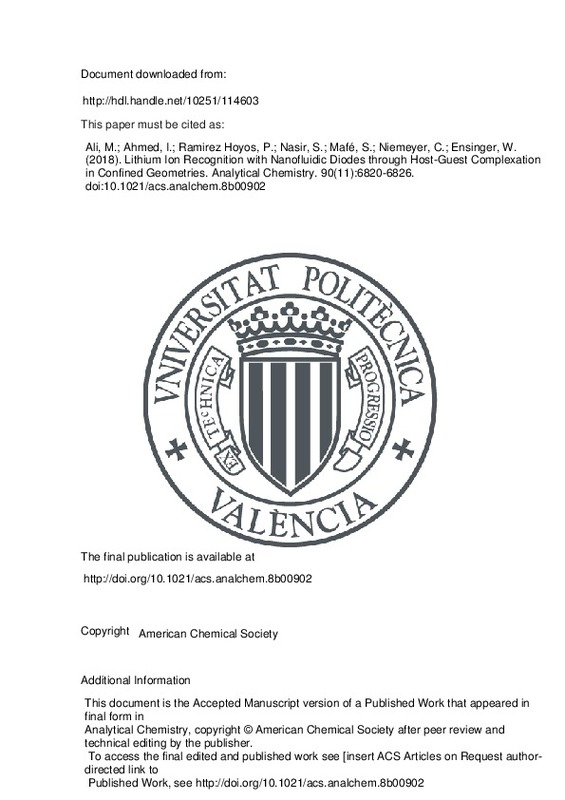JavaScript is disabled for your browser. Some features of this site may not work without it.
Buscar en RiuNet
Listar
Mi cuenta
Estadísticas
Ayuda RiuNet
Admin. UPV
Lithium Ion Recognition with Nanofluidic Diodes through Host-Guest Complexation in Confined Geometries
Mostrar el registro sencillo del ítem
Ficheros en el ítem
| dc.contributor.author | Ali, Mubarak
|
es_ES |
| dc.contributor.author | Ahmed, Ishtiaq
|
es_ES |
| dc.contributor.author | Ramirez Hoyos, Patricio
|
es_ES |
| dc.contributor.author | Nasir, Saima
|
es_ES |
| dc.contributor.author | Mafé, Salvador
|
es_ES |
| dc.contributor.author | Niemeyer, Christof
|
es_ES |
| dc.contributor.author | Ensinger, Wolfgang
|
es_ES |
| dc.date.accessioned | 2018-12-29T21:01:07Z | |
| dc.date.available | 2018-12-29T21:01:07Z | |
| dc.date.issued | 2018 | es_ES |
| dc.identifier.issn | 0003-2700 | es_ES |
| dc.identifier.uri | http://hdl.handle.net/10251/114603 | |
| dc.description | This document is the Accepted Manuscript version of a Published Work that appeared in final form in Analytical Chemistry, copyright © American Chemical Society after peer review and technical editing by the publisher. To access the final edited and published work see [insert ACS Articles on Request author-directed link to Published Work, see http://doi.org/10.1021/acs.analchem.8b00902 | |
| dc.description.abstract | [EN] The lithium ion recognition is receiving significant attention because of its application in pharmaceuticals, lubricants and, especially, in energy technology. We present a nanofluidic device for specific lithium ion recognition via host guest complexation in a confined environment. A lithium-selective receptor molecule, the aminoethyl-benzo-12-crown-4 (BC12C4-NH2), is designed and functionalized on single conical nanopores in polyethylene terephthalate (PET) membranes. The native carboxylic acid groups on the pore walls are covalently linked with the crown ether moieties and the process is monitored from the changes in the current voltage (I-V) curves. The B12-crown-4 moieties are known to specifically bind with lithium ions and when the modified pore is exposed to different alkali metal chloride solutions separately, significant changes in the ion current and rectification are only observed for lithium chloride. This fact suggests the generation of positively charged B12C4-Li+ complexes on the pore surface. Furthermore, the nanofluidic diode is able to recognize the lithium ion even in the presence of high concentrations of potassium ions in the external electrolyte solution. Thus, this nanodevice suggests a strategy to miniaturize nanofluidic porous systems for efficient recognition, extraction, and separation of lithium from raw materials. | es_ES |
| dc.description.sponsorship | M.A., S.N., and W.E. acknowledge the funding from the Hessen State Ministry of Higher Education, Research and the Arts, Germany, under the LOEWE Project iNAPO. P.R and S.M. acknowledge financial support by the Spanish Ministry of Economic Affairs and Competitiveness (Grant MAT2015-65011-P) and FEDER. I.A. and C.M.N. acknowledge financial support through the Helmholtz Programme BioInterfaces in Technology and Medicine. The authors are thankful to Prof. Christina Trautmann from GSI (Department of Material Research) for support with the heavy ion irradiation experiments. | es_ES |
| dc.language | Inglés | es_ES |
| dc.publisher | American Chemical Society | es_ES |
| dc.relation.ispartof | Analytical Chemistry | es_ES |
| dc.rights | Reserva de todos los derechos | es_ES |
| dc.subject.classification | FISICA APLICADA | es_ES |
| dc.title | Lithium Ion Recognition with Nanofluidic Diodes through Host-Guest Complexation in Confined Geometries | es_ES |
| dc.type | Artículo | es_ES |
| dc.identifier.doi | 10.1021/acs.analchem.8b00902 | es_ES |
| dc.relation.projectID | info:eu-repo/grantAgreement/MINECO//MAT2015-65011-P/ES/NANOFLUIDICA DE POROS BIOMIMETICOS: NUEVAS APLICACIONES EN CONVERSION DE ENERGIA Y SENSORES%2FACTUADORES/ | es_ES |
| dc.rights.accessRights | Abierto | es_ES |
| dc.date.embargoEndDate | 2019-06-05 | es_ES |
| dc.contributor.affiliation | Universitat Politècnica de València. Departamento de Física Aplicada - Departament de Física Aplicada | es_ES |
| dc.description.bibliographicCitation | Ali, M.; Ahmed, I.; Ramirez Hoyos, P.; Nasir, S.; Mafé, S.; Niemeyer, C.; Ensinger, W. (2018). Lithium Ion Recognition with Nanofluidic Diodes through Host-Guest Complexation in Confined Geometries. Analytical Chemistry. 90(11):6820-6826. https://doi.org/10.1021/acs.analchem.8b00902 | es_ES |
| dc.description.accrualMethod | S | es_ES |
| dc.relation.publisherversion | http://doi.org/10.1021/acs.analchem.8b00902 | es_ES |
| dc.description.upvformatpinicio | 6820 | es_ES |
| dc.description.upvformatpfin | 6826 | es_ES |
| dc.type.version | info:eu-repo/semantics/publishedVersion | es_ES |
| dc.description.volume | 90 | es_ES |
| dc.description.issue | 11 | es_ES |
| dc.identifier.pmid | 29732883 | |
| dc.relation.pasarela | S\373476 | es_ES |
| dc.contributor.funder | Ministerio de Economía y Competitividad | es_ES |







![[Cerrado]](/themes/UPV/images/candado.png)

